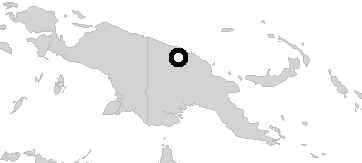
| www.CuriousTaxonomy.net |
|
The Flood in World Myth and Folklore
New Guinea |
| © 2021 Mark Isaak |

In Kumbwinmbitngai village, a man prepared a meal using sago grubs, sago, and cocount cooked in a banana leaf. A cousin of his named Wobowi visited and tasted the meal, which was sweet and luscious, and he asked for the recipe. "You must cut off your wife's breast and mix it with the sago," his host replied.
When Wobowi proposed the meal to his wife, she did not want to comply, but she acceded when told how sweet the meal was, and that his cousin's wife had given her breast and was still well. Wobowi cut off his wife's breast, and she died soon after. Wobowi confronted his cousin, castigating him and saying, "Why would you do this to your cousin?", but he got no satisfaction.
The rest of the village was preparing for a festive ceremony while Wobowi mourned at home. Vowing revenge, he gathered clusters of betel-nuts and valuable shells to bring to three ancestral spirit crocodiles. Dropping the gifts into the water at the swamp home of Mendangumeli, the largest and most powerful of the spirits, he beseeched the spirit to destroy the village. Mendangumeli rose and demanded an explanation, and Wobowi told his story of how his cousin had caused him to kill his wife, and how the village would not join in his mourning. Mendangumeli agreed to help and told Wobowi to build a platform atop a tall coconut palm.
Wobowi returned home, built the platform, gathered his family and possessions onto it, and waited. After five days, rain began, and two water lilies sprouted in front of the men's ceremonial house. Curious about these plants which normally grow only in swamps and lakes, the villagers plucked the lilies, and water began shooting in torrents through holes where the plants had been. Water rose and began flooding the region. At Mendangumeli's instruction, Wobowi speared and killed his deceitful cousin amid the confusion. The flood destroyed the village and killed everybody there except Wobowi and his family.
Still, the waters continued to rise. Wobowi, hoping to appease Mendangumeli with gifts, threw into the water shells, pork and betel-nuts. Mendangumeli appeared and told Wobowi to get on his back with his family and possessions. They did so, and the crocodile carried them to dry land. Then he grasped Wobowi's daughter in his jaws, took her to a rival village, and allowed them to kill and behead her.
Eric K. Silverman, "The Waters of Mendangumeli: A Masculine Psychoanalytic Interpretation of a New Guinea Flood Myth--and Women's Laughter", Journal of American Folklore 129 (2016): 183-184.

Long ago, during funerary rights, men would compete against women in a tug-of-war with a long rattan vine tied to a totemic carving of a hornbill. Although it was immoral, the men and women were naked, and when one side pulled over the other, they engaged in indiscriminate sex.
One day, a young man resting in the men's cult house overheard other men telling of their sexual experiences with the wive of his older brother. He was shocked at the woman's behavior, but even moreso by the gossip. He later told his brother, and the two planned a retribution. Taking valuable shells, a pig, a dog, and a chicken, they canoed to the river home of the spirit crocodile Mendangumeli. There they roused the sleeping spirit by slapping the water with a paddle, and they threw the shells and meat into the water.
A small crocodile surfaced. It was Mendangumeli. The brothers pulled him into the canoe and told him their story. Then they put Mendangumeli into a net bag, whereupon he grew to his full, enormous size. They paddled away and put him in a hole in the ground.
People at the village were still playing the tug-of-war game. Suddenly lightning and thunder crashed, and heavy rain erupted. A water lily, which normally grows only in swamps, sprouted in the middle of the waterhole where Mendangumeli resided. The villagers were curious about it, and they pulled it up. From its broken stem a torrent of water flowed forth.
The two brothers, with their families and all their possessions, went to a platform at the top of a tall coconut palm. The water from the lily stem continued flowing, flooding the village and killing everybody. Fearing that the water would continue rising and drown them and their families, the two brothers threw in shell valuables and other gifts, but to no avail. So the brother decorated their sister with cosmetics and ornaments and threw her into the water. Mendangumeli ate her, and the waters receded. The brothers and their families repopulated the area.
Eric K. Silverman, "The Waters of Mendangumeli: A Masculine Psychoanalytic Interpretation of a New Guinea Flood Myth--and Women's Laughter", Journal of American Folklore 129 (2016): 189.
